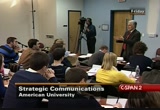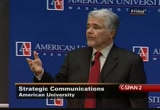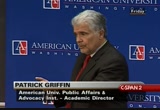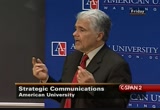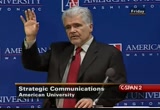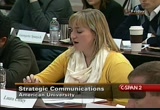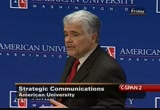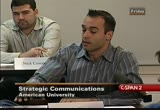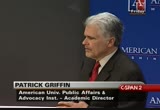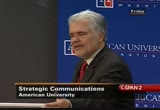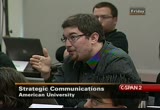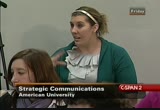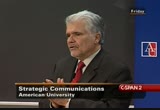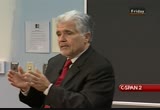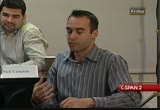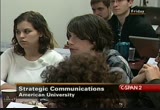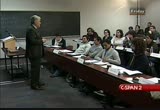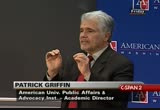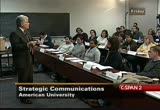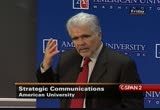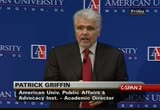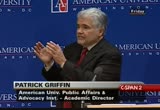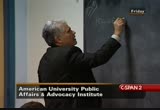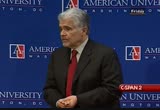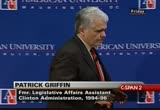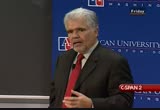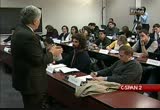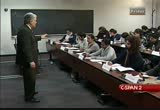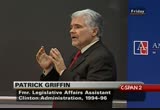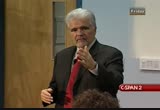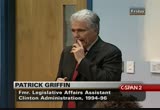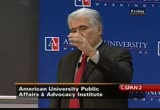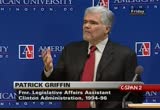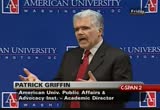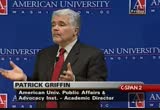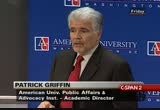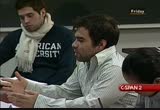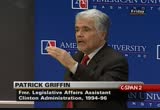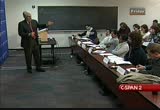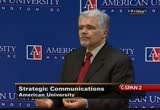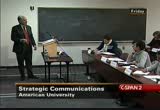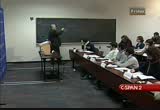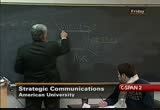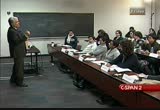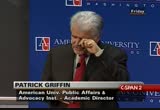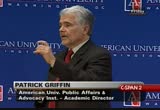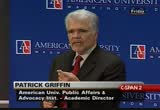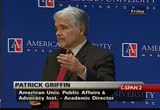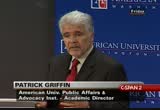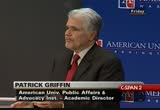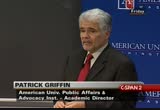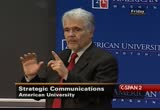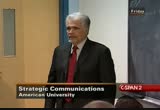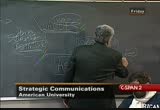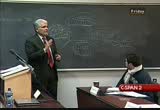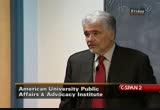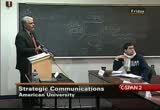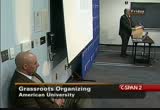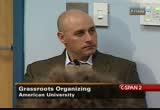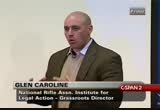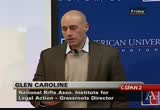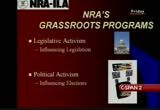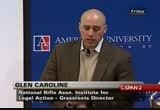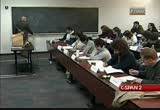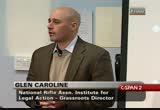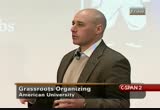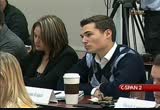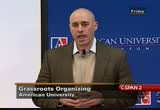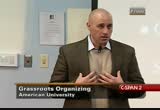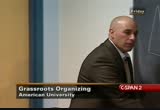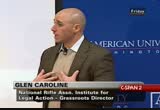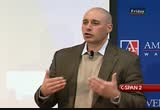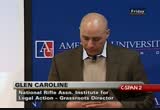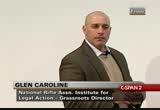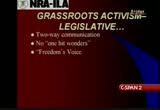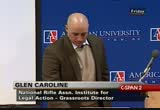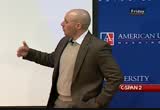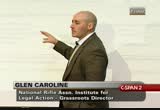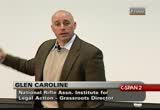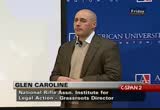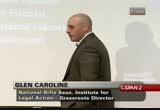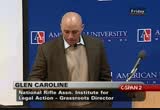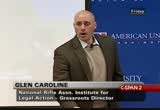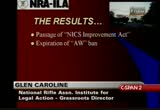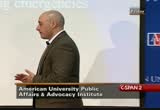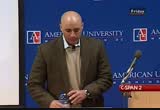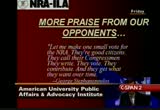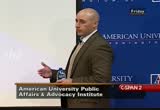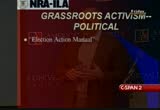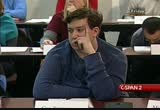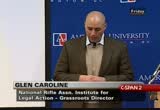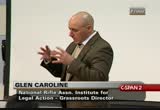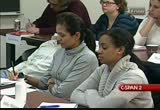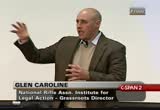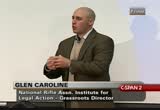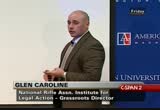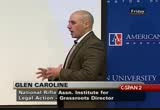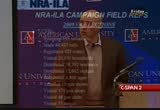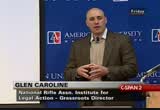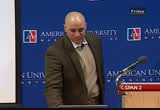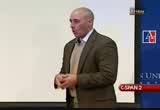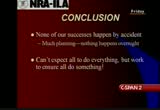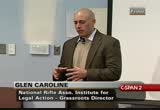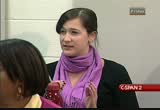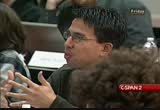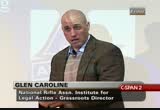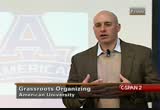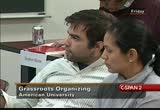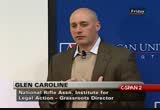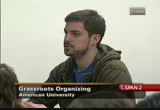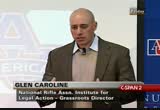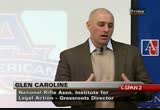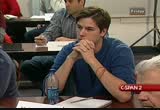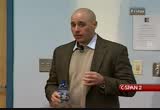tv Today in Washington CSPAN January 1, 2010 6:00am-8:00am EST
6:59 am
7:00 am
as pat said i think regardless where you fall on the spectrum of opposing andwxñ supporting control in the second amendment most political practioners of washington, d.c. will acknowledge we do a very good job in the grassroots arena. in this day and age, grassroots as a campaign tactic in elections as well as legislative advocacy becomes more and more important. everybody in this room i'm certain have heard the term "grassroots" but if you were to give a functional working definition of what grassroots it's a little bit difficult. it's kind of nebulous if you will. so let me kind of walk you through what we believe grassroots to be at the national rifle association. what we are talking about is both educating and empowering citizens to engage in the legislative and political processes. these are the same side of the coin. it's critical you have a constituency that's educated that understands the dynamics of
7:01 am
the issues and understands how to take that information and actively have an impact on the process. two of the most dangerouswsá ts i think you can have is somebody who has all the knowledge on a particular issue but no way to translate that knowledge into action. conversely to have somebody who's ready to charge any hill and do anything you want for them but has no idea what he or she is talking about is equally problematic. so as we navigate the dynamics of grassroots at the national rifle association, we're always talking about two sides of this coin, education, and empowerment. for the purposes of my discussion today in talking about the nra and its grassroots programs i'm going to break down the discussions into two parts. one iswf#5"l legislativeññ acti which obviously is influencing legislation both trying to defeat the bills of the second amendment and advancing legislation that we believe strengthens the rights of law-abiding gun owners in this country. and, of course, political activism. which in effect is basically working in an election year to
7:02 am
elect or defeat candidates for political office. i've had the luxurylñu in my 18-year career at nra to be on both sides of the grassroots issue. for a year or so i worked down at nra's capitol hill office as one of its lobbyists where i would go and i would interface with united states senators, congressmen and members of their sjñ and says and hear firsthand from them what it was like to be communicated to on an issue by an nra member. seeing just mail bucket after mail bucket after mail bucket of letters and seeing phone logs, page after page after page of nra members and gun owners making their views known on a particular issue. so that was very rewarding. now as the director of the grassroots it's my job to make sure our lobbying team has that air support when they go in to talk to a member of congress in a way of hundreds if not hundreds or7;é tens of thousand communications from their prosecond amendment constituents. one of the most important things to understand about the nra is who is our base?yúm who is it that we are targeting for education and mobilization?
7:03 am
first and foremost we're talking about nra's nearly 4 million dues-paying members which makes us one of the largest organizations in the country. i sometimes would do panels from my from the aarp and my jaw will hit the floorçnh when theywúbof their 40 million members so 4 million is nothing to boast on that. a little bit later i'm going to talk about the effectiveness we've had with a group core constituency of 4 million members. within our membership structure, i always like to refer to how we operate somewhat asgv, an inver pyramid an upside down triangle. traditionally when you talk about a peyramid the tip or the top is the top. the topmost important point is the base of the pyramid our 4 million members. as you get down to the tip of the pyramid you talk about the professionalw!ç staffs such as myself, our board of directors and some of our nationally knoww
7:04 am
actors and wayney&t la pierre a probably the best example of the tip of our pyramid is we were blessed for four years to have charlton heston as our president who opened up doors to communicate to the american people. heston an important figure he was for the nra that he stood>ye on the shoulders ofe nra members and the only way we succeeded is because of this strong solid base of the pyramid that drives everything that we do. above and beyond all that we have about 19 now -- what we front line volunteers that are our most politically and legislatively active volunteer base that i will discuss in a moment and we represent the nation's 80 million or so lawful american gun owners. many obviously who aren't dues-paying members of the association and clearly are part of our foundation. one thing i want to make we are not the fire organization organization. we won't represent those who
7:05 am
manufacture and sell firearms. they have a separate andr3 ñ ve effective organization called the national shooting sports foundation that represents more of the industry side. our constituents are the lawful consumers of these products. the road to legally exercise their second amendment rights as is guaranteed by our constitution. when we go say if i was here speaking to you today as a representative of the pga tour of america, professional golfers
7:06 am
association and i was talking about expanding the base of people who were interested in golf, i'd be reaching out at pga tour events and driving ranges and golf shops and sporting goods shops. it's the same philosophy. what we do is we use rifle shot precision to target our volunteer outreach in those areas where we think we'll get our best return investment. our opponents who don't have these built-in luxuries have to use a scatter shot approach where they cast a big net and they hope to reel in some supporters but they often reel in a lot of opponents as well. this is a distinct advantage that we have in our opponents that we can really target our outreach efforts in place where is we're going to get an extremely high return on that effort. as pat said in my introduction we currently are a staff of 11 folks and we're broken down into two sort of distinct but overlapping at the same time components within the division. half of the staff function much like a legislative assistant or legislative aide on capitol hill. they answer the incoming phones
7:07 am
and emails and fax and letters we get on anything political or legislative dealing with the second amendment of the national rifle association. the other half of our office is sort of like our field he operations. they are the ones who are training the activists, who are doing public speeches and going out to gun clubs and speaking and going working on various districts and campaigns with gun owners. the reason a grassroots division now handles the incoming legislative queries to the nra is that we believe every person who takes the initiative to contact us be it by email or phone or fax or letter is demonstrating that first version, that one characteristic we are looking for in a volunteer. that is this person is willing to take action. whether they are calling to pat us on the back or complain we want to take that enthusiasm and harness it in our grassroots activities. not only will we give them the answer to the question they're answering but we'll flip that conversation to tell them now what they can do with that information to help us move the ball up the hill.
7:08 am
i frequently will speak at political conferences here in washington, d.c., and around the country and it never ceases to amaze me how many political professionals be they the supporters of the nra or the opponents of the nra who will come up to me and tell me how effective gun owners are as an activist and voting bloc. those who are political professionals know that the nra has a very strong, united and active base of support that they can bring to bear on a particular legislative issue or race. and i think some of the recent rankings where magazines and publications rank lobbying organizations shows this. not too long ago "fortune" magazine ranked the nra the most effective lobbying organization in the united states of america. a couple of years after that, the "national journal" ranked us the national effective organization advancing our agenda on capitol hill. and let me just wrap up this part of the discussion by noting a pole that was done by john zogby in 2007. this is about two years ago. where he found that 27% of
7:09 am
voters are more likely to support the nra-endorsed candidate than the candidate we are not supporting. that translates into about approximate 40 million votes in a national election year. some of the things that i thought was interesting is when zogby compared what level an nra endorsement has with other politicians and celebrities when you look some of the people we outpaced it was pretty impressive. that means we were more influential than an endorsement by president clinton, by president bush it is first and the afl-cio than oprah winfrey or barbra streisand. when the nra gives its "good housekeeping" seal of approval to a candidate it's votes and boots on the ground for candidates. before we get into some of our legislative strategies and our job at the national rifle association in engaging citizens to become active is not altruistic. my job is not to ensure that 100% of all americans are engaged in the process.
7:10 am
my goal is that 100% those who support the goals of the national rifle association is engaged in the process. that's why targeted outreach is so important. so let's talk a few moments to talk about activating our base and keep in mind when we talk about legislative activism we're talking about either passing legislation or defeating legislation. we're talking about bills that may be pending in congress or in a state legislature or even right down in the city or town council. we run the gambit in our level of involvement. what i think we have found that works best at the nra and what more and more organizations are now doing is a combination of traditional lobbying and grassroots. we have a capitol hill staff of about 7 or so federal lobbyists and we have about a dozen or 13 or so state lobbyists that are each responsible for either a number of congressional delegations or a number of states that they're response for legislative activities.
7:11 am
and i guess a good way to understand what our lobbyists do, they are the ones who are directly dialoging with elected officials and members of their staff and their job almost in a way is like a funnel. if i try to draw a funnel that's probably not so great. you can imagine the number of ways there are to attack or promote a particular issue when it comes to a gun related issue whether it's statistics or personal stories or experiences in other states. when you're talking with a lawmaker, sometimes it's just a short walk in a hallway. we have a couple few seconds or maybe it's 2 or 3 minutes before a committee hearing. our lobbyists have to be effective in taking all the different talking points and a way to talk and promote an issue they are going to the top of the funnel and make sure they're talking to a lawmaker or a member of his or her staff with his or her time, they are making an compelling and cogent argument in favor of our position as they possibly can. what we do in the grassroots division is we make sure when they're in talking to a lawmaker, that lawmaker is hearing our lobbyist position amplified over and over again by
7:12 am
his voting constituents that are supporters or members of the national rifle association. the people who actually are the the lawmakers bosses, his constituents. that's very important. frequently i'll be approached by outside organizations who want to talk to me about how the nra goes about engaging its membership or recruiting volunteers. and very often these folks will talk about these grandiose plans that they have using outside vendors and mail lists and phone campaigns and internet consultants. one of the things that we do very well at nra that i commend to all grassroots organizations is to first take a step back and evaluate what existing internal resources you may have at your disposal. we have a number of delivery mechanisms that we use to communicate legislative and political action with our members. for example, one of the many benefits that one receives in being one of our 4 million dues members is a choice of subscriptions to handful of magazines.
7:13 am
each one of our existing 4 million members gets a magazine sent to him or her when give us a great opportunity to communicate with that audience on a regular, ongoing basis. i noted earlier the fact and the reason why the grassroots division handles the phones and the emails and the correspondence is because we want to make sure not only are we providing timely and accurate information to educate folks who contact us, we want to use the skills that we have to also empower them and activate them to take the information we're providing and turn it into substantial legislative or political activism to help advance our political goals. clearly when we're in the field we spend a lot of time representing nra at gun shows and attending gun club meetings or showing up at our state association, our state affiliate banquets. or, you know, going to a shooting range when they have an event to speak to gun owners. this is a great way for us to personally interface with our constituents which is extremely important in this day and age of emails or long distance phone calls to have that personal interaction, to have that
7:14 am
personal relationship is really one of the primary reasons nra has been so successful. we also make sure that we base our grassroots successes upon our human resources, not financial resources, but human resources. we very much pride ourselves on the fact that we have constant two-way communication with our volunteers. it is a dialog. it's not just us talking to them from the washington, d.c., area. we listen to what they have to say. it's impossible for us in, you know, the metro d.c. area to monitor every single challenge or opportunity and every nook and cranny in this great country of ours. we do rely on our members and volunteers to alert us to challenges and opportunities that we can take advantage of and that we can speak with an amfly bull horn to speak to a larger universe. we also want to make sure that we don't have any one hit wonders. that is we don't to call or email somebody in a crisis. we want to keep our members engaged throughout the entire legislative process.
7:15 am
as pat can tell you, it's a lot easier to defeat a bill in a particular committee than when it gets to a particular floor of the house of the united states senate. so we want our members to be fully buying into the legislative process from the time a bill is introduced until there's a time there's resolution by a chief executive officer. whether it's a progun bill being signed into law or an antigun bill being vetoed. because we need their assistance every step of the way. and we also want to let them know how their efforts along the way have helped us succeed. you know, thanks to your calls, we managed to defeat this bill in the house judiciary committee or thanks to your emails or your meeting with your lawmakers, we managed to pass this progun reform out of the house of representatives. we need them involved in every stage of the way for them to be effective they need to have a history of how the bill progressed and where their efforts can help and how their efforts help. every month we send out an activist newsletter to thousands of folks called freedom's voice.
7:16 am
it's not so much of a regurgitation of relevant news as much as it's more to how to become an even more effective grassroots activist. every week we transmit what we call the grassroots alert which goes to about 1.7 million folks by email. it's also posted on our website. this traditionally goes out every friday so you can imagine at week's end on friday upwards of 2 million folks will have seen and read information in this grassroots alert. excuse me. and what that does is it summarizes the previous week's activities in congress and state legislatures and in the courts, you know, in the media. and it also gives them a forecast or an action item which may be coming down the pike next week or what they may need to do. we may be talking about a bill that may be introduced in a particular community and the next we may be talking about a grassroots campaign that our members are contacting members of that committee to pass a bill. this is an comprehensive and
7:17 am
up-to-date we transmit because it goes out on a weekly basis. we also use the more traditional communication tools that most organizations do. postcards when we have the luxury of time where we want to give something -- something in a blaze orange postcard which is kind of the nra calling card that jumps out from the rest of their mail that contains a substantive you but concise message or phone banks where we have live operators of the nra or use automated phone calls to contact members in a particular district or a particular state to get them to contact their lawmaker. in support or opposition of a particular bill. and then as i alluded to a moment ago we have our front lines program. now, people join the national rifle association and support us for myriad reasons. some are gun collectors, some like to hunt, some are self-defense enthusiasts and some are competitive shooters. virtually our folks have a common thread that unites them that they believe very strongly in the god-given constitutional protected right we have under the second amendment to legally
7:18 am
keep firearms. so what we try to do with our front lines program is to try to identify from this universal supporters who are those folks we think we can count on most in a pinch when we need somebody to step up to the plate and be activated? so we started this front lines program not too long ago. we have about 19,000 members in it right now. the way one enrolls is we have this form that as you can see up top kind of collects the essential information we'll need and ask them a series of short questions if a local activist can contact them for networking purposes, that i'll talk about in just a moment. that's the first question there. things like if they want to receive our email alerts, if they're a registered voter, if so which party so we can reach only republicans or democrats and we have a mechanism to do so. and then what are they interested in doing? making phone calls, writing letters to the editor, things to that nature.
7:19 am
now, clearly whenever possible if we can tailor our outreach action to something that they indicated they're willing to do, we're going to get more people to opt into that. if you check off i want to help and knock on people's door and we contact you to knock on people's doors there's a better chance you're going to respond than if we had to contact somebody i want to help distribute yard signs. there are times where we have to have an all-hands deck call where everybody is making a phone call. we want everybody to send an email or we want everybody to attend an event that we're doing. but if you can tailor your request based on what somebody has indicated they are interested or willing to do you're vastly increasing the chances they're actually going to take the action that you want them to take. of course, in this day and age i don't think any organization can get by without a sophisticated, integrated web and email base presence. before i talk about some of the tools that we use as a legislative advocacy organization, let me again reiterate the point that one of the things that i believe distinguishes the nra from all
7:20 am
other organizations isn't the fact that we utilize technology very well because we do. it's because we have people that you'll hear a little bit later who are out in the field actually touching and talking with the very constituents we hope to mobilize. we have relationships with our key activists that makes a very harmonious group of core activists out there who are willing to answer the call to action because of the personal bonds that we built in the past and we continue to sustain and grow in the future. we have an email list of about 1.7 million folks at our website by entering your zip code you can identify and contact all of your lawmakers from the president down to your state delegate and everybody in between. you can also identify and contact newspapers that have circulation or tv or radio stations so that you can send an email directly to them on a piece of legislation, on a piece of reporting that maybe they've done in the media. we also at times will have very high profile issues.
7:21 am
either high profile national issues, maybe a very pressing state issue, we will create separate subdomains in our website so that we will drive people specifically to that area to ensure they'll take action on the most pressing item. in 2004, president clinton's ineffective and misnamed assault weapons ban was set to expire. now we wanted to make sure that people realized that this was one of our front burner issues so we had a dedicated website called president clinton santa clarita gunban.org that we would drive people directly to that had video, that had how much do you have contact information for lawmakers and talking points and how to effectively communicate with your lawmakers since this was a front burner issues and to ban lawsuits and allowing qualified citizens to carry firearms concealed in various states so there's a way to drive traffic specifically to a dedicated subdomain website to ensure our members are focusing on the association's top priority.
7:22 am
we also use streaming video from time to time. some of the grassroots training that myself and the grassroots coordinators would do at an annual convention for the nra in particularly targeted congressional district will sometimes film that and post it our website so people who couldn't get to our training websites could get the same type of training and information by logging onto their computer and watching it online from the comfort of their home. we are certainly making a splash in trying to get more active in the social networking community. our facebook grows. we have 160,000 friends. myspace we have nearly 10,000 friends. youtube we probably have close to 135, 140 nra gun-related videos posted up there. and twitter, which is one of the newer phenomenons we're getting involved in, we probably have 2,000 followers but we're really taking advantage of trying to get involved in these social networking sites because we understand the impact they are now having on the way people communicate with one another.
7:23 am
we also to bypass what is to be kind the so-called mainstream media not getting both sides of the story when it comes to an nra issue or a gun issue, we have an nra news radio program that's broadcast online and also on satellite radio where we have news stories and guests and interviews to talk directly to the american people who want to access this on gun-related issues to bypass the filter on a sometimes a very hostile media. any issue under the sun dealing with gun control whether it's a state issue or a federal issue we have fact sheets and other educational items. it's white papers that explains why the nra takes a particular position on what we do and gives statistics and studies and independent third-party credibility to our positions so that we have a hard copy that we can send out to people but that are also housed on our websites so that people can access on the information they need if they are writing a letter to the editor, if they're having a debate over the dinner table with their friends. if they're going to a gun show
7:24 am
or a town hall meeting. our website is really a self-contained one-stop-shopping for all of our activist needs and finally, when congress is on recess, we'll post and alert our members via members via town halls in their particular district. an interesting story to tell you about the power and focus of nra members, back in the early 1990s, what we would do as a recess was approaching we would have staff contact lawmakers and say we'd like to get a list of your town hall meetings well, they would send that to us and we would in turn send it out to the tens of thousands of nra members in their district and a town hall meeting where a congressman wanted to talk about healthcare and taxes would turn into nra priorities on gun-related issues. so some lawmakers become more hesitant to share that information with us. but rather than look at that as a barrier what we did we then engaged our membership to that work for us because there's not a lawmaker on the face of a earth when a constituent contacts them and said i want to come to your contact meetings i
7:25 am
want a list. they would share it with us and then we would inform our members of where and when the particular town hall meeting was going to be held. we would give them a list of our legislative priorities to discuss. we would give them talking points on how to be effective and courteous and focused at the town hall meeting and now we have a presence when congressmen are back in the district that we and the 10,000 gun owners talk about. so we have a better way of lawmakers may vote on a particular issue. let's look at some of the results we've had. i'm sure you guys are from a number of different states here so let's look at the national level. our professional and grassroots lobbying results have been very effective in recent years we passed a bill to improve the national instant check background system to ensure that people who are disqualified under federal law because of mental adjudications are in effect included in the check as they should be, as the law required, as nra has been advocating for decades. we managed to get federal
7:26 am
legislation to address that recently. as i said in 2004 that's when president clinton passed an ineffective ban on semiautomatic firearms that was set to expire. there was a 10-year sunset provision in 2004 that bill was set to be stricken from the books unless congress voted to reenact it. due to a lobbying and education campaign, that bill in fact expired from the books without even a vote, without congress taking any action on it. we passed a bill not too long ago to ensure that legal manufacturers and sellers of firearms could not be sued when a criminal illegally broke the law to get a gun and misuse the firearm. mayor michael bloomberg and a number of big city mayors were working with trial attorneys to try to sue those who legally made and sold firearms for the act of third-party criminals. we got federal legislation passed to outlaw those types of suits. and to say the only type of suit that could be filed is when a law is broken or the firearm is truly defective.
7:27 am
we passed a law following the tragedy in hurricane katrina where one of the untold stories that was told by nra through nra news and elsewhere was the fact that when people needed their right to self-defense most, the police chief and mayor ray nagin ordered law enforcement officials to go house to house to confiscate the guns owned by lawfully -- owned lawfully by legal citizens. we wanted to make sure if there was a declared state of emergency in america never again would our government officials be confiscating guns from law-abiding citizens. we managed to pass that through the state and federal levels to pass that. and we managed to pass a law to an amendment to a credit card reform bill to allow people who legally own firearms to carry in national parks and wildlife refugees to make sure their right to self-defense didn't end when they crossed into a national park. and i always say it's very easy when somebody who supports your agenda pats you on the back and says you do a good job. i think it speaks volumes about your efforts when your opponents can say, hey, i might vote against you. i might disagree with you but
7:28 am
you guys are very effective in what you do. so let me put up some quotes. these two quotes from the same congressman says the nra does a great job in lobbying members. it's good, straight democracy. he also said the most successful political organization in america is the national rifle association. they don't do anything other than lobby members. they write and they call and they talk to members. and that's obviously barney frank, a congressman from my former home state of massachusetts. at the time congressman frank uttered this latter statement i believe he was the chair of the house judiciary committee, one of the high ranking members of the house judiciary committee where probably 90% of nra's gun-related legislation had to go through. so here's a guy who has definitely earned his f rating from nra, who votes against the rights of gun owners every time he has the opportunity but nonetheless says they do a good job. one more quick one. somebody who worked in the clinton white house. let me make one small vote for the nra. they're good citizens. they call their congressman they write and vote and they
7:29 am
contribute and get what they want over time. this was from former clinton staffer and now abc host george stephanopoulos. again, people who work for and against the nra at times nonetheless saying they do a good job. let's switch gears and talk a little bit about some of our strategies in an election year whether it's a congressional year like we saw in 2008, the presidential congressional year or like 2010 in next year or even just this past year, this year, 2009 in virginia where we were very engaged. we are involved in the political process because we want to make sure that those who are elected to office, that are going to be voting for and against our second amendment rights -- that we have as many folks who support the constitution and the second amendment casting those votes as soon as possible. that's the reason we are involved. that's the reason we have voter registration drives and people working on campaigns and we have a political action committee because we want to make sure that the people who are elected to represent our interest have a respect and understanding to the united states constitution.
7:30 am
many of the strategies and tools and programs that we use legislatively to advance our agenda we also use politically. more and more of the grassroots division which i work is becoming more involved in the election side of this in addition to what we've traditionally done legislatively. i talked about the education component. probably the best document we have is something that's actually called the election and legislative action manual. this is a document that's brokenzon into two sections. one talks about strategies and guidance to be an effective political activists in a campaign and the other talks about an effective legislative activist to help pass or defeat legislation. when we first drafted this manual it was about an 85-page hard copy document that just a couple few years ago we transferred to cd-rom acknowledging more and more people are reading documents online and it was more effective and update the information. we have probably distributed i'm going to say three-quarters of a
7:31 am
million of these manuals teaching people how to become even more effective activists. it has something for somebody who's never, you know, licked a stamp and put a letter in anna envelope to their elected officials, to things for people who want to have a fundraising event for their particular candidate in their district. what we're trying to do is we're trying to show our members and supporters, there's something for everybody. and once you get accumulated to doing the easy things and you see how effective they can be, we hope you'll do more and when you're ready to do more, there are other things in this manual that we can walk you through on. pat said at the outset the importance of voter registration. we know the only audience that counts on election day are the people who are eligible to vote. if you're not registered to vote, you don't have a voice on election day so obviously what we want to do, again, using rifle-shot precision is to make sure as many folks who support nra and the second amendment and our candidates as possible are registered to vote so they can cast their ballot on election day. they can take that ultimate step
7:32 am
of volunteerism and actually vote on election day. because at the end of the day, it doesn't matter how many envelopes you stuffed or how many signs you distributed or how many stickers you have in your vehicle, if you can't take that ultimate step of flipping the switch for our candidate, you're selling yourself short. so we want to first make sure as many folks are eligible to vote and then we have to motivate them to turn out to vote. so again, we use our magazines, we use our website, we use our personal staff resources, we use our phones, we use email to promote voter registration. every election year we will research the requirements for all 50 states, dates, deadlines for primary and general election, is it a closed primary, an open primary, is it a semi closed primary and we will have that information and hard copy so that we go to gun shops and ranges and clubs. we can share that information with folks. but it's also posted on our website so that people can get the information they need simply by clicking a button. we also have a mechanism by which they can fill out a voter
7:33 am
registration form on our website to become members. you saw the picture on the front page, this right here, we have about three of these -- what we call voter registration kiosks that we take with us across the country to our natural resources, shows, shops, ranges, clubs. what this is -- we have two flat screen tvs where we have a looping video maybe a speech by charlton heston, maybe it's an infomercial, we have a laptop computer with a printer so that people can come by and if they're not registered to vote they can print out that form right then and there and get all the requirements they need on the spot. so we have a few of those that we take with us wherever we go. of course, we use the internet. not only for voter registration but we have a number of other features. first and foremost, if you want to find out the contact information for a particular prosecond amendment candidate, their headquarters their email and website we have all that campaign contact information on our website. we have in an election year a
7:34 am
political preference chart that lists the various grades of candidates running for office, if they're prosecond champions they will be a or antigun they will be graded an f. and they could be graded somewhere in between. they are compiled in the political preference charts and which candidates earned our endorsement. we're not saying you're an a-rated candidate and we're endorsing you for office. we publish these not only in our magazines that are delivered to all of our 4 million members but in our political action committee website as well so that people can see this information online. i talked about the web training workshops. many of those are geared toward election activism. doing a voter registration drive, writing letters to the editor, the importance of yard signs and bumper stickers. we'll put these up on our website so that people around the country who may not be able to attend one in person can actually see how we go about training our members.
7:35 am
we have nra-specific campaign yard signs. i'm the nra and i vote. vote freedom first and vote those slogans that we sell at no cost to us totally online and we get a cut of the profits so we're able to raise funds by getting our message out there using the internet. we have a multimedia section on our pac website that has our radio ads, our tv ads, our print ads so that people can see what we're saying and how we're doing and how we're supporting progun candidates and antigun in the district and their state. and the best example of our grassroots prowess and activities, however, is what we call our evc program. this program was started in 1994. and we work to identify an individual member and as many in the 435 congressional districts as possible. that we recruit and train to act, i guess, as the liaison, if
7:36 am
you will, the go-between nra members and gun owners in his jurisdiction. and the various campaigns we're supporting for office. so in a perfect world if i was the evc in my district, i'd introduce myself and talk about the network of 25 people i have and when you need phone banks or get in touch with me and i'll activate my members, my volunteer network. we currently have about 270 of the 435 districts covered. obviously, there are some districts where it's a little bit more challenging than others to get an evc and in districts we don't have a candidate that we necessarily support so our focus obviously is to try to make sure we have a trained, competent, active evc and all the priority districts we'll be working on. on the noncongressional years we activate these evcs to work with our legislative agenda. if there's something going on in their town council we want to
7:37 am
make sure that volunteer resource base we usual live use in an election year is brought to bear upon our legislative agenda as well. on our website we have a way to promote and list the evcs by zip code or state. you can click your state on the map all the evcs and contacts will come up. if you don't know what congressional district you have, you plug it in and get all the information. in the 2008 elections about 20 days before election day, we had upwards of 103,000 hits on the find your evc site where people -- in the weeks leading up to election day clicking to identify who is my local election volunteer coordinator that i can get in touch with. we also will before the month of the election sort our magazine distribution list by congressional district so that each member will get inked on the front cover of his or her magazine the information of his specific volunteer coordinator, their name, phone number, and email. so these guys are the most active, the most crazy people in the world because their name and
7:38 am
address -- excuse me, name, phone number, email are going to magazines that could go to 10, 15,000 folks in a congressional district and this is how we help promote and build their volunteer networks. something we've recently taken to doing, we started it in 2008 and we did it in the 2009 virginia elections are hire campaign field reps. these are basically folks who have campaign management experience or maybe voltaire coordinator experience that we'll hire and we'll train. in 2008 we had them targeted about 17 different congressional districts across the country. working on behalf of our endorsed candidates. and in virginia, in 2009, we had them in about 6 or 7 different regions in the state helping us with our endorsed candidates for governor, lieutenant governor, and attorney and in 14 targeted house of delegate races where we wanted to have a boots on the ground across the street presence where we would put them on the district for probably three or four months and they would focus on things like volunteer recruitment and voter
7:39 am
registration and letters to the editor campaign and yard sign and bumper sticker and literature distribution and precinct walks and phone banks and special events and get out the vote, and election day activities. basically they were running a mini grassroots campaign. they were campaign managers basically trying to mobilize their prosecond amendment community in support of the candidates we were supporting for those candidates in office. we had seven campaign field representatives again in key areas around the commonwealth of virginia supporting the three statewide candidates and 14 candidates of virginia's house of delegates. they recruited 695 volunteers. they made 80,437 phone calls. they visited almost 25,000 households. they distributed nearly 40,000 candidate-specific brochures. they distributed almost 13,000 bumper circumstances. nearly 5,000 yard signs and attended 19 gun shows and they attended 500 gun shops, they
7:40 am
visited 48 clubs and visited 73 ranges so this was over the course of three, three and a half months where these campaign representatives were living in these particular regions working with progun candidates and progun activists. again, let's talk about the results. we looked at some of our recent legislative results. let's look at what happened just about a month or so ago in virginia. the three candidates we endorsed for statewide office, paul mcdonald for governor and others. all three swept and by convincing margins. i mean, it was a landslide in virginia. and i said of the 14 house of delegate race where is we had a campaign field rep working we won all 14 of them. if you expand that a little bit, larger and step back beyond just the campaign field representatives we won 95% of the house races we were involved in >> so let's do as we did when we
7:41 am
concluded the legislative discussion. let's not to look at what our allies and our friends and our supporters say about the efficacy of our grassroots efforts. let's take a look at one of our opponent said. you've got to give it to them they've done a good job. they probably had more to do than anyone else in the fact we didn't win the house this time and they hurt al gore. our apologies to our friend pat griffin that was president bill clinton after the 2000 elections. a guy who authored and pushed through the brady bill, which we opposed, the antigun so-called assault weapons bill, that we opposed. who nonetheless said, you know, when you look at what they did in those 2000 elections, that we had a lot to do with the direction of those elections. and we talk about one last program before i stand down and take questions and that is our goal to reach out to college-age students to basically replenish and supplement the ranks of volunteers to ensure that the
7:42 am
next generation coming up is well-educated, well versed on second amendment issues and understands how they can be effective suppose men for our cause. the nra is a new program as i said for us to try to identify younger individuals who share the passion and commitment to the second amendment that we do to make sure we'll have a future corps of volunteers well into, you know, the next decade who will be able to pick up with the mantle of freedom that we're trying to instill upon them. we host training sessions on campus. we probably did a half a dozen in the last year. a few months ago we were in ohio where we had 200 students come to one of these and we talk about the second amendment, it's historical significance, what it truly means. we give them information on gun control, wide particular pieces of legislation and proposals. we don't feel are best for reducing crime and restrict the rights of law-abiding gun owners. we talk about what can you do on campus to educate your fellow students? and how can you work offcampus with our election volunteer
7:43 am
coordinators, with our campaign field representatives to have an impact in an election in your area. we have sort of -- i call age-appropriate fraternal items, certainly t-shirts and hats i may no longer at but folks who are 18 or 19 years old might wear, you know, water bottles, key changes, bags, you know, those types of things and we really promote our events and our outreach through social networking sites specifically facebook. we have an nra-used specific facebook site, the straight shooter newsletter you learned about in my introduction. that's given primarily to college students and folks who are congratulations or alumni of the nra university program. as i said one of our largest events was university of toledo just a few months ago where we had 200 folks attend. none of our success happens by accident. i'd given you just a small peek behind the curtain as to how the nra goes about recruiting and mobilizes its supporters. we don't have time in the hour or so that i have to meet with you today to talk about all the different things that we do.
7:44 am
but what i can assure you we don't win just because we show up. we win because we plan, we prepare, we improve upon things, we perfect programs and it's an ongoing process. to be successful in the grassroots arena it takes a lot of planning and nothing happens overnight. i've met with groups who are just starting out forming grassroots, who have been doing grassroots for a couple of years. they said we want to be like the nra. i tell them right up front, no group is going to be like the nra. at least not right away. because we have one of the largest, most dedicated, educated, passionate bases of support of any constituency in america. sort of it's unrealistic to think any group can replicate exactly what we do because we have a number of built-in advantages and we've been doing this for quite a long time and continuously and improving and perfecting our strategy. what we always tell folks and you look at that legislative action manual there's so many things everybody can do that we can't expect more do we expect everybody to do everything but
7:45 am
our goal is to make sure everybody who supports our cause does at least something because there truly is something for everybody to do even those folks who may have very little experience to date. so with that said, with the remainder of my time, i'd love to take questions and suggestions. i'll leave this information up here if anybody wants to visit our website or contact the grassroots division and learn a little bit more about the association. that's how you can get us. and we'll just go around the room. go ahead. >> yes. this has to do with grassroots and coalition-building. we're dealing with the issue of cap-and-trade, obviously, the nra deals with the issue of guns and gun ownership. but in all the coalitions that you might have been a part of over the years as the nra, would the nra be open to working with groups that may oppose cap-and-trade or support cap-and-trade if you are affiliated with those groups and previous coalitions? >> good question. nra has a mandate that we are in addition to being a nonpartisan organization a single issue organization.
7:46 am
so the only issues in which we will get involved are those that directly or tangentially on gun ownership. we don't get on business on environment or the war in afghanistan. we have a built-in base that's very diverse on other issues saying we believe in the constitution and we want to preserve this. for us to get in a tangent that don't bear on that would fracture a unified base of support. we are restricted as a single issue organization from only working on issues that have a bearing on a direct relationship to protecting the rights of law-abiding gun ownership. we'll go to you in the back. >> you guys have a lot of different tactics that you use are very successful. i wanted to ask about the election action manual 'cause i know if i was a part of an association and even if i was passionate about it if you gave me an 85-page manual i don't
7:47 am
know how convinced i'd be to read the whole thing. do you have evidence on how effective that is in particular? because it seems like a really good idea to give them ways to -- >> it is one tool in our toolbox. i think looking at the overall picture of how we go about recruiting and organizing our members in results i just laid out to you is just a snapshot of some of the successes that shows how we do things works very well. does everybody sit down and read that election action manual cover to cover, probably not. some people don't need to. does everybody read a couple few sections of our action corps, they probably do. we have a number of different tools in our toolbox is what we use. if you're not going to be one to read the election action manual maybe you'll go to the workshop and get the training that way. we try to give enough options for everybody and what is the best mechanism for me in how to be a better activist. >> it's pretty obvious that you have developed a pretty effective strategy to mobilize
7:48 am
supporters but like you said it's always easier to get praise from people who already are on board, you know, with their cause. i'm wondering is it ever effective or is it ever -- do you ever feel the need to go after people who are still on the cusp of whether or not they want support or go antigun? and if you're even more ambitious is it more beneficial group to go out to people to, you know, switch sides? >> look, i think there's always merit to try to convince people of the merits and the superiority of your position, your argument. and, in fact, most of my time at this university centers on doing debates and discussions to try to do just that. but at the end of the day, with limited time and limited budget you have to decide when there's an issue you need to mobilize people on how much time do you want to spend spinning your wheels in an audience that may not be helpful where you could take somebody who may be sort of teetering either way and you can convince him or her of the superiority of your argument. it's the same with lobbying.
7:49 am
probably on any given issue you have a known universe of people who will work with you and some who will not work with you and an issue that could be a middle where you're competing for those folks. it probably makes more sense to try to convince those in the middle who are pliable than trying to flip those people who you know he is going to be against us. you have to decide based on your budget and time how much you want to spend convincing the unconvincible as opposed to trying to make inroads if not maybe on every single issue on a couple of areas of commonality to bring some people in the middle over to your side. >> do you ever find members or supporters are put off or irritated by too much communication and where do you find that balance between not enough and too much especially with emails and things like that? >> that's a great question. you know, especially with the advent of email it's so easy to communicate a message that you do have to decide when is something pressing, where they really need to take action and what is something that's informational. it's a tough balance to strike.
7:50 am
what we try to do is we kind of segregate our email list as best we can based on providing information that people want. for example, when you sign up four or email loads, you can check i want state alerts for my state and dealing with something on my son's state and i want stuff dealing with national legislation and hunting. you can have an a la carte menu. and i use the term all hands on deck yahoo! what you signed up for, if you're a gun owner and a second amendment member this is a call of action. everybody needs to get information on this particular issue. any way you can kind of individualize what you communicate with people to give them what they want that would be ideal but you have to overlay that over the fact that sometimes there are things that are so pressing and important that affect everybody that everybody has to take action on. >> can you talk about a little bit more -- i know you discussed the beginning the air support that it provides to your lobbyists. but what role does your display
7:51 am
of force within a district have in a lobbying meeting? are you going in discussing how many members you have in the district and like what kind of information are you presenting to them about your activism within their congressional district and courting a lawmaker? >> good question. our membership counts and numbers are confidential but i think most lawmakers will know that when we communicate a message to our membership based on a member of congress' voting record or how he or she plans to vote that they're going to feel some heat. they're going to get emails. they're going to get faxes and phone calls. they are going to get letters. so i think there is just a general acknowledgement that when the nra communicates to its members they want a call to action to communicate to a lawmaker, you can go back to that lawmaker's office and see pretty quickly that the message worked and people actually took the potential action. what we try to do, though, we try have our troops at the ready through our outreach recruiting and training so when a lobbyist calls me and says congressman
7:52 am
smith we're getting ready to vote on this bill i think he needs to hear on your opinions. and what's the best way for congressman smith can hear from our constituents. and the election volunteer coordinators know their elected officials personally and have a relationship because they are known activists so sometimes you may want to activate one of two your grassroots photos who speak for thousands of gun owners but who the congressman or senator may have a personal relationship with. >> you guys are obviously well developed. what advice would you give to smaller campaigns who are starting grassroots organizations? i know you talk about building these close relationships but kind of what tools would you use and where would you kind of, you know, as a starting point? >> are you guys seen the movie the patriot with mel gibson and there's a scene where his sons are getting ready to ambush a group of british soldiers and they have limited ammunition so mel gibson tells his son aim small and miss small if you aim at a small target the chances are going to be less because you're focused.
7:53 am
i would advise groups starting out to aim small and miss small in the sense you should try a limited number of programs on a microscale to find out what works well and what doesn't work so well before you think you've got the keys to the kingdom and you try it on a macrolevel. when we try something new when something is in development i like the opportunity to do it on a limited test basis so that you can work out the kinks before you go on a large base. my recommendation to you is identify what you think the two or three key components are of your grassroots program and then do a test on a small universe to see how they work or don't work before you go to a larger one. [inaudible] >> how do you maintain a certain level of engagement when there's not a high profile legislative issue when you're not in an election year and i'm sure there's always something going
7:54 am
on in state legislatures and one state is not going on. how do you keep your membership active? >> one of the biggest challenges is how to sustain a level of activism and passion and involvement when there isn't an immediate threat. that's challenging for any organization. we do a couple of things. first, we try to work with our election volunteer coordinators to make sure that they are engaged with their volunteers on a regular basis and sometimes in a social setting maybe i'll go into the range for a skeet shoot or get together to watch a dvd that nra produces so there's more of pa passpass ..
7:55 am
>> we get newspaper clippings from all across the country talking about different proposals or statements or things. our members are keenly aware of the fact that it comes to protecting their gun rights, vigilance is truly the price of liberty. they are trained and focused, their level act committee is pretty much always sustain. there are peaks and valleys where it's sometimes more difficult to engage them by the end of the day the passion and focus that our members have on what their government officials are doing as it pertains to the constitution is at a very high
7:56 am
level all the time. so makes it a little bit easier for a group like the nra and maybe at a group that has an issue only once a year in an appropriations setting or something like that. we always have something on somewhere. >> we talked about in our previous session, we were talking about messaging. would you say that it's better to have more of a singular message for all your nra base, or do you try to have different messages for, say, your hunters, when you talk to them on a grassroots level? >> i think the ends that need to be the same, but the means need to be specialized as best they can. at the end of the day, if there is a bill to ban a particular type of firearm, if the legislative body as attacking what type of gun, he's attacking all types of guns. what you need to make sure our what we need to make sure is that every gun owner, whether he owns that type of gun right now, understands what's at stake and
7:57 am
is engaged in the process. but the message that motivates this feature might be different from someone who owns a hunter. so the more information you can get on what interest and what mobilizes and empowers your constituency, the better you continue that message. a message to a hunter may be different than a message of a competitive shooter, but at the end of day you want them contacting their lawmakers and supporting a bill. >> with regards to the budgeting that goes behind the grassroots strategy, what topics do you feel gives you the most return on investment or the biggest bang for your buck? >> it's hard to say, because each situation sometimes is a little bit unique. there's sometimes what you need a personal meaning in the district to rally and make gun owners.
7:58 am
for that particular issue that's the best way to do. other times, a web-based or e-mail campaign may be the best. there's sometimes what you have to go direct mail, you have to use phones. so they are all important. i think what you have to have is you have to have the flexibility and understanding while at any time you can use any strategy, sometimes picking the best strategy for a particular issue makes the most sense. and apodictic time is going to give you the biggest return on investment. but sometime down the road it may be different. you need to have a complete understanding of all the tactics in your arsenal but know that sometimes you may only want to use one or two because that's going to give you the best, most immediate return. >> in looking at utilization of handguns in d.c., my understanding of tactics was a single individual challenge to the law took it all the way to the supreme court so that is sort of i guess the grassroots judicial strategy?
7:59 am
>> i think that's a legal strategy. once at issue is in the courts there's not much you can do to lobby a judge. in fact, in time to probably be counterproductive. what we do at that point is we make sure we keep our mentorship and formed of the dynamics, where the cases, you know. when they may hear the case, what a negative disposition may mean for the future of the second amendment right, what we're hoping to get out a particular case. that's part of the education component that we want mature our members understand when there's something on in the courts, that they are able to articulate to other folks to let you know the challenge of the opportunely have based on a court ruling. it's very hard if not impossible at times i think to really mobilize your grassroots to put pressure on a judicial outcome because it's just not set up the same way as an elective body is. >> thank you very much. >> thank you. i appreciated. happy n
182 Views
IN COLLECTIONS
CSPAN2 Television Archive
Television Archive  Television Archive News Search Service
Television Archive News Search Service 
Uploaded by TV Archive on

 Live Music Archive
Live Music Archive Librivox Free Audio
Librivox Free Audio Metropolitan Museum
Metropolitan Museum Cleveland Museum of Art
Cleveland Museum of Art Internet Arcade
Internet Arcade Console Living Room
Console Living Room Books to Borrow
Books to Borrow Open Library
Open Library TV News
TV News Understanding 9/11
Understanding 9/11